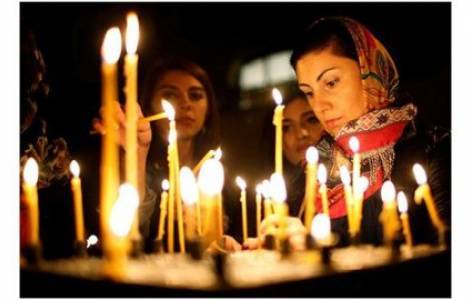The Pope in Ajaccio and the missionary soul of popular spirituality

The Pope in Ajaccio and the missionary soul of popular spirituality

By Gianni Valente
Rome (Agenzia Fides) – There is a People of God, gathered and sustained by Jesus, who continue to implore his presence and his comfort in the afflictions of life, placing their hopes in the words of simple prayers. And it has been this grateful recognition of the vitality of said people that has prompted Pope Francis, on the threshold of Christmas, to make a lightning trip to French lands. On Sunday, December 15, the Holy Father participated in the closing session of the Congress “La Religiosité Populaire en Méditerranée”, held in Ajaccio, Corsica.
References to popular spirituality run through the entire teaching of Pope Francis like a living and fruitful common thread. This is a recurring note that does not arise from nostalgic justifications, nor with the intention of “rehabilitating” practices and gestures that certain “progressive” circles disqualify as naive expressions that should be discouraged or, in the best of cases, tolerated. after a necessary “purification”.
The Pontiff, even before becoming Bishop of Rome, has always highlighted the missionary value of the simplest and most everyday acts of devotion of the People of God. During his priestly and episcopal ministry, he has been able to experience that in such manifestations “underlys an actively evangelizing force that we cannot underestimate: it would be like despising the work of the Holy Spirit” (Evangelii Gaudium, § 126).
Pope Francis does not remember popular spirituality only as an expression of the dynamic of inculturation through which each people manifests faith in Christ in forms specific to their culture. The feature that, for Pope Bergoglio, characterizes the profound origin of this spirituality is its “theological” dimension: its intimate connection with the very work of the Holy Spirit, who guides the People of God “towards the truth and leads them to salvation.” ».
The Holy Spirit, as the Bishop of Rome constantly reminds, following the Tradition of the Church, grants the faithful People an “instinct” of faith – the sensus fidei -, which helps them to recognize and follow the action of Christ’s grace. This sensus fidei of the People of God, gift of the Spirit and sign of his predilection, is manifested with special strength and clarity in what Pope Francis, even in his programmatic Apostolic Exhortation Evangelii Gaudium, defines as “spirituality” or “popular piety.” . Such popular piety, a set of simple and authentic gestures and practices, reflects how “the people continually evangelize themselves” and must be recognized as a genuine expression of the spontaneous missionary action of the People of God (Evangelii Gaudium, §122). .
In his first Apostolic Exhortation, Pope Francis takes up quotes from the Aparecida Document – the result of the V Assembly of CELAM held in 2007 – to highlight “the riches that the Holy Spirit displays in popular piety by his free initiative” (EG, § 124). Popular piety, defined as a “spirituality embodied in the culture of simplicity,” carries with it a missionary dynamism that encourages us to leave ourselves and be pilgrims. In this regard, the Pope recalls: “Walking together to shrines and participating in other manifestations of popular piety, bringing one’s own children or inviting other people, is in itself an act of evangelization” (EG, §124).
The current Bishop of Rome has repeatedly distanced himself from the arrogance of those who disparage gestures of popular spirituality as mere manifestations of natural religiosity. In Evangelii Gaudium, Pope Francis writes: «Whoever loves the faithful people of God cannot see in these actions a mere natural search for divinity. They are the manifestation of a theological life animated by the action of the Holy Spirit, who has been poured into our hearts” (EG, §125).
In the preface to Enrique Ciro Bianchi’s book on the Theology of the People, the Pope firmly reiterates that “popular spirituality is not the Cinderella of the house. It is not those who do not understand, those who do not know. I’m sorry when someone says: “Those need to be educated.” We are always haunted by the ghost of the Enlightenment, that ideological-nominalist reductionism that leads us to despise concrete reality. And God wanted to speak to us through concrete realities. The first heresy of the Church is Gnosticism, which the apostle John already criticized and condemned. Even today there may be Gnostic positions regarding this fact of spirituality or popular piety.
The late Argentine priest Rafael Tello, a key figure along with Father Lucio Gera in the Theology of the People, also deeply appreciated this custom of gestures and practices with which the people evangelize themselves “better than even priests usually do.” . According to Tello, the request to baptize children represents the most important manifestation of this spirituality.
In recent weeks, the announcement of the papal trip to Ajaccio has generated enlightening reflections among French scholars and commentators. Camille Dalmas, at Aleteia.org, has documented with historical accuracy the surprising revival of brotherhoods in Corsica. For his part, the essayist Jean Duchesne has highlighted how popular spirituality acts as an “antidote” to clericalism and contemporary elitist intellectualism.
Furthermore, Professor Yann Raison du Kleuziou, interviewed by Marie-Lucile Kubacki for the weekly La Vie, has taken up the intuitions of the Dominican and sociologist Serge Bonnet and the priest Robert Pannet. These authors, already in the seventies, documented how popular devotion was the subject of criticism by elitist circles who, “in the name of the modernization of Catholicism,” ended up imposing an insidious clericalism. These sectors not only generated feelings of guilt among the popular classes, but, ironically, they claimed to “speak on behalf of the people.”
(Agenzia Fides 12/14/2024)
Share:





